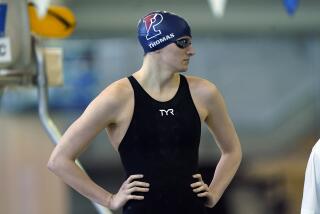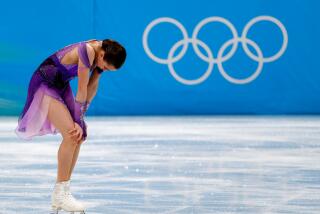Swimmer Smith Is Banned by FINA
- Share via
After two years of suspicion about steroids and diuretics and testosterone and human growth hormone, a shot of Irish whiskey apparently has derailed the competitive swimming career of three-time Olympic champion Michelle Smith.
The pride of Ireland after her shocking triumphs at the 1996 Atlanta Olympics, Smith was banned from competition for four years Thursday by the International Swimming Federation (FINA) for tampering with a urine sample by allegedly adding a lethal dose of alcohol, believed to be whiskey.
According to a statement released by FINA, “unequivocal signs of adulteration” were found in a urine sample taken from Smith on Jan. 10 in an unannounced out-of-competition doping test.
“The content of alcohol of the sample . . . is in no way compatible with human consumption and the sample shows a very strong whiskey odor,” the statement continued.
FINA’s doping panel determined that “the urine was manipulated; the urine had not been manipulated in the laboratory; the urine had not been manipulated during transport; the urine had not been manipulated by the collectors of the sample; the urine was manipulated by the swimmer [but] the way of manipulation is uncertain.”
Alcohol can be used as a masking agent for certain performance-enhancing drugs in a doping test. When the International Olympic Committee-accredited laboratory in Barcelona informed FINA of its findings Jan. 30, testers claimed that the concentration of alcohol in Smith’s sample was intense enough to have killed her, had she drunk it.
Smith denied the allegations when they became public in April, but a second test conducted on May 21 of the “B sample” confirmed the earlier findings.
The four-year suspension, which takes effect immediately, effectively ends Smith’s career as a world-class swimmer. Smith will be 32 by the time her suspension expires in August of 2002. In the interim, she will miss both the 2000 Sydney Olympics and the 2001 world championships.
Smith is believed to be the first elite international athlete to be suspended for tampering with a urine test.
Her lawyer, Peter Lennon, said he would not comment on the suspension until a news conference today in Smith’s hometown of Dublin. Previously, Lennon had said he would appeal any ban of his client by FINA, possibly to the Swiss-based Court of Arbitration for Sport.
Smith became a target of rumor and innuendo after her startling performance at the Atlanta Olympics. Until then a mid-range swimmer of little note, Smith won three gold medals in Atlanta--the 400-meter freestyle, the 200-meter individual medley and the 400-meter individual medley--as well as a bronze in the 200-meter butterfly.
Adding to the suspicions was the fact that her coach, and now husband, Erik de Bruin, a former discus thrower, had been banned for four years for testing positive for high levels of testosterone.
Smith had continually denied all allegations and no tests after the 1996 Olympics indicated any use of a performance-enhancing substance, although she did rankle FINA officials by once refusing to participate in a post-meet test.
The Jan. 10 test was conducted as part of FINA’s random out-of-competition testing program in Kilkenny County, Ireland, near Smith’s home. FINA charges Smith with tampering with the sample by possibly adding whiskey to the specimen jar, although no banned substance had been found in the sample.
Smith has only publicly commented on the matter once, reading from a written statement during a news conference in Dublin on April 29.
“I am innocent of these charges,” she said then. “I am appalled at the manner in which they have been leaked into the public domain and I intend fully defending them, if necessary, all the way to the International Sports Court in Switzerland.
“I have no intention of taking this lying down and I have no intention of being bullied by any organization, national or international.”
FINA contends that Smith violated two rules--first by using or taking “advantage of a banned procedure,” and by using “substances and methods which alter the integrity and validity of urine samples used in doping.”
Smith’s suspension follows a drug scandal-ridden Tour de France bicycle race and the suspension of American track athletes Randy Barnes and Dennis Mitchell for failing doping tests.
This summer of drugs in international sports has prompted the IOC to call a special meeting in Lausanne, Switzerland, to study the problem.
The meeting is scheduled for Aug. 20, but, evidently, it cannot be held too soon.
More to Read
Go beyond the scoreboard
Get the latest on L.A.'s teams in the daily Sports Report newsletter.
You may occasionally receive promotional content from the Los Angeles Times.






